#Department of Drug Administration
Text
Drug and Medicine Related Act, Rules, Regulations, Policies, Guidelines & Directives in Nepal
Drug and Medicine Related Act, Rules, Regulations, Policies, Guidelines & Directives in Nepal
Overview
Government of Nepal has established Department of Drug Administration (DDA) in 1979 to implement and fulfill the aim of Drug Act 1978 and various regulations under it. The National Drug Policy 1995 focuses on establishing co-ordination among government, non-government and private organizations involved in the activities related to medicine production, import, export, storage, supply,…

View On WordPress
#Department of Drug Administration#Drug Act#Drug and Medicine#Drug Registration Regulation#Hospital Pharmacy Guideline#National Drug Policy#Policy & Guidelines#Publications
0 notes
Text
Trump White House staffers were apparently big pill poppers. And we're not talking about generic ibuprofen or Vitamin C.
The White House has its own pharmacy. It's run by the military because the president happens to be commander-in-chief of the armed forces. But during the Trump administration things went awry – as you might expect.
For years, the White House Medical Unit, run by the White House Military Office, provided the full scope of pharmaceutical services to senior officials and staff—it stored, inventoried, prescribed, dispensed, and disposed of prescription medications, including opioids and sleep medications. However, it was not staffed by a licensed pharmacist or pharmacy support staff, nor was it credentialed by any outside agency.
The operations of this pseudo-pharmacy went as well as one might expect, according to the DoD OIG's alarming investigation report. The investigation was prompted by complaints in May 2018 alleging that an unnamed "senior military medical officer" was engaged in "improper medical practices."
[ ... ]
Provigil is a drug that treats excessive tiredness and is typically used for patients with narcolepsy, sleep apnea, and other sleep disorders. Brand-name Provigil is 55 times more expensive than the generic equivalent. Between 2017 and 2019, the White House pharmacy spent an estimated $98,000 for Provigil. In that same timeframe, it also spent an estimated $46,500 for Ambien, a prescription sedative, which is 174 times more expensive than the generic equivalent. Even further, the White House Medical Unit spent an additional $100,000 above generic drug cost by having Walter Reed National Military Medical Center fill brand-name prescriptions.
While they were plotting to repeal Obamacare for millions of Americans, Trump staffers were getting brand name stimulants and sedatives cheap and sticking US taxpayers with the bill.
They were handing out baggies of drugs to staffers going on trips overseas.
The staffer told OIG investigators that ahead of overseas trips, the staff would prepare packets of controlled medications to be handed out to White House staff. "And those would typically be Ambien or Provigil and typically both, right. So we would normally make these packets of Ambien and Provigil, and a lot of times they’d be in like five tablets in a zip‑lock bag. And so traditionally, too, we would hand these out. ... But a lot of times the senior staff would come by or their staff representatives... would come by the residence clinic to pick it up. And it was very much a, 'hey, I’m here to pick this up for Ms. X.' And the expectation was we just go ahead and pass it out."
Trump wanted to send the US military into Mexico to go after drug kingpins. But he was running his own out of control drug dispensing operation financed by tax money.
The Department of Defense Inspector General's report detailed how Schedule II drugs were poorly inventoried and monitored. (emphasis added)
The Code of Federal Regulations requires that registered pharmacies maintain inventories and records of Schedule II controlled substances separately from all other pharmacy records.16 In our site visit to the EEOB Clinic, we concluded that the clinic maintained the controlled substance inventory records in a binder on hand‑written paper logs, stored in the EEOB clinic’s medication dispensing area. The inventory records showed that White House Medical Unit stocked four different types of Schedule II opioid pain medications (fentanyl, hydrocodone, morphine, and oxycodone), as well as medications from Schedules III through V, such as stimulants and sedatives. However, White House Medical Unit kept the records for its Schedule II medications in the EEOB’s inventory binder together with records for all other controlled medications and not maintained separately as required by the CFR.
So the Trump White House pharmacy also included opioids which were not properly kept track of. The Trump drug mill was a microcosm for his administration as a whole.
#donald trump#trump white house#trump staffers#white house pharmacy#pill pushers#ambien#provigil#baggies of drugs#opioids#schedule ii drugs#department of defense inspector general#sloppy inventory#poor management#trump administration#election 2024
33 notes
·
View notes
Text
The Biden administration’s Department of Health and Human Services is recommending that the Drug Enforcement Administration significantly loosen federal restrictions on marijuana but stopped short of advising that it should be entirely removed from the Controlled Substances Act.
The health agency wants the drug moved from Schedule I to Schedule III under the CSA, potentially the biggest change in federal drug policy in decades.
HHS Assistant Secretary of Health Rachel Levine wrote in a Tuesday letter to the DEA, first reported by Bloomberg News, that the recommendation was based on a review conducted by the Food and Drug Administration.
The DEA confirmed to POLITICO that it received the letter.
“As part of this process, HHS conducted a scientific and medical evaluation for consideration by DEA. DEA has the final authority to schedule or reschedule a drug under the Controlled Substances Act,” a spokesperson for the agency said in a statement. “DEA will now initiate its review.”
The HHS letter is part of the official review process initiated by President Joe Biden last October: The FDA conducts the review, which is then sent to the National Institute on Drug Abuse and HHS, after which HHS transmits a letter of recommendation to the DEA. The DEA is not required to follow HHS’s recommendation.
The White House on Wednesday refused to comment on the review process.
“The administration process is an independent process led by HHS, led by the Department of Justice, and guided by evidence,” White House Press Secretary Karine Jean-Pierre told reporters. “We’re just not going to comment on that.”
Cannabis is currently a Schedule I substance on the CSA, which means it is deemed to have a high likelihood of abuse and no medical uses. Heroin and LSD are also Schedule I drugs. Schedule III drugs are categorized as having “moderate to low potential for physical and psychological dependence.” The category includes ketamine and testosterone.
The HHS recommendation is the result of a nearly yearlong federal review of all available marijuana research. Biden’s executive action — which also included federal pardons for low-level marijuana convictions — was seen by many as a political move taken ahead of the midterm elections to incentivize turnout among younger and more progressive voters.
At the time, advocates and some lawmakers urged Biden to take clear steps to remove cannabis completely from the CSA — versus rescheduling it. Legalization advocates on Wednesday reiterated that rescheduling would not solve many of the problem they’ve been asking the Biden administration to correct.
“Rescheduling cannabis from 1 to 3 does not end criminalization, it just rebrands it. People will still be subject to criminal penalties for mere possession, regardless of their legal status in a state-level medical program,” cannabis advocate Justin Strekal told POLITICO on Wednesday.
FEDERAL-STATE CONFLICT
Federal law has failed to keep up with massive changes over the last decade in state cannabis policies. 23 states now allow anyone at least 21 years old to legally posses the drug, while 38 states have established medical marijuana programs.
But because cannabis businesses are not federally legal, they are subject to a federal tax code that prohibits narcotics traffickers from taking typical tax exemptions for business expenses like salaries and benefits. That code does not apply to Schedule III, so if the DEA approved HHS’ recommendation, cannabis businesses around the country would immediately be paying much less in federal taxes.
That would provide a big boost to the financially struggling industry.
“It’s giant,” said Charlie Bachtell, CEO of Cresco Labs, one of the country’s largest cannabis companies, in an interview. “I think you would see a healthier cannabis industry a year from now.”
Rescheduling could also mean legislative changes on Capitol Hill, where a bill to make it easier for banks to offer financial services to the cannabis industry — backed by Senate Majority Leader Chuck Schumer (D-N.Y.) and Sens. Steve Daines (R-Mont.) and Jeff Merkley (D-Ore.) — has been slowly plodding toward the finish line.
Changing marijuana’s federal classification would almost certainly make it easier for cannabis businesses to access banking services and raise cash even without any legislative changes.
“I don’t see a need for the SAFE Banking Act if this in fact becomes the official position,” said Jonathan Havens, a cannabis attorney at Saul Ewing who previously worked for the FDA. “I’m not saying that all banks will want to jump into this space, but the need for safe harbors I don’t think exists like it does today.”
Schumer on Wednesday urged the DEA to “quickly follow through on this important step” but added he is “continuing to work in Congress to pass important marijuana legislation and criminal justice reform.”
The shift in federal cannabis policy would also make it easier to conduct research on the health effects of cannabis consumption and for pharmaceutical companies to bring cannabis-based drugs to market. Researchers have long chafed at restrictions that only allow them to procure cannabis from a single farm at the University of Mississippi that bears little resemblance to the high-potency products many consumers are purchasing in state-legal markets.
But if the FDA decides to fully enforce regulations on the cannabis industry as it does all other Schedule III drugs, that could mean major changes for state markets.
“The question that I have is whether or not the current industry will eventually be replaced by the pharmaceutical industry,” said Rachel Gillette, head of the cannabis practice at Holland & Hart, noting that ketamine and anabolic steroids are also Schedule III drugs. “I can’t go down to the corner store and buy those things.”
Some state regulators, however, don’t think that much will change.
“This adjusts the type of security and type of bureaucracy that exists around federal research into the substance [and] it would make it easier for companies to bring cannabis based pharmaceuticals into market,” said John Hudak, Director of Maine’s Office of Cannabis Policy, in an interview. “But in terms of administration of a state program, it has very little impact.”
MIXED RESPONSE
The cannabis industry on Wednesday was ebullient, while drug legalization advocates and some lawmakers had a more tepid — or downright condemnatory — response to the news.
“We believe that rescheduling to Schedule III will mark the most significant federal cannabis reform in modern history,” said Edward Conklin, executive director of the US Cannabis Council, an advocacy and trade group, in a statement. “President Biden is effectively declaring an end to Nixon’s failed war on cannabis and placing the nation on a trajectory to end prohibition.”
While the industry would see immediate financial benefits from a loosening of federal restrictions, however, criminal penalties on cannabis would not change dramatically. That prompted some advocates to criticize the HHS recommendation.
“This shift would fall woefully short of the promises made by President Biden during his 2020 presidential election campaign, especially promises made to Black and Brown communities,” said Cat Packer, director of drug markets and regulation at the Drug Policy Alliance, which advocates legalizing all drugs.
Anti-legalization advocates, meanwhile, blasted the move as potentially detrimental to public health.
“The addiction profiteers who have been exposed for lying about marijuana’s physical, mental and economic impacts, are desperately looking for legitimacy in the wake of mounting evidence their products are harming millions of Americans,” said Kevin Sabet, president of Smart Approaches to Marijuana, in a statement. “It is regrettable that the Department of Health and Human Services move now appears to be a nod to those monied interests.”
#us politics#news#politico#2023#biden administration#department of health and human services#Drug Enforcement Administration#Controlled Substances Act#marijuana#cannabis#Rachel Levine#National Institute on Drug Abuse#Department of Justice#schedule i drugs#schedule iii drugs#ketamine#testosterone#anabolic steroids#sen. Chuck Schumer#sen. Steve Daines#sen. Jeff Merkley#SAFE Banking Act#federal taxes#decriminalization#decriminalize drugs#war on drugs
10 notes
·
View notes
Text
By Julia Conley
Common Dreams
May 16, 2024
The decision "validates the experiences of tens of millions of Americans, as well as tens of thousands of physicians, who have long recognized that cannabis possesses legitimate medical utility," said one advocate.
As Democratic lawmakers push for the federal decriminalization of marijuana, U.S. President Joe Biden on Thursday announced the Department of Justice was formalizing a proposal to remove the substance from Schedule I—the legal classification which for decades has placed marijuana in the same category as heroin.
The Drug Enforcement Administration's (DEA) proposal to reschedule marijuana under Schedule III—which would place it alongside substances like testosterone and steroids—was submitted as a Notice of Formal Rulemaking in the Federal Register, commencing a 60-day public comment period.
After the comment period and any public hearings that are requested by interested parties, the DEA is expected to issue a final order on reclassifying marijuana.
In a video message posted to social media, Biden called the step his administration has taken "monumental" and said marijuana's current classification suggests it is more dangerous than "fentanyl and methamphetamine—the two drugs driving America's overdose epidemic."
"That just doesn't add up," said the president. "Today's announcement builds on the work we've done to pardon a record number of federal offenses for simple possession of marijuana, and it adds to the action we've taken to lift barriers to housing, employment, small business loans, and so much more for tens of thousands of Americans."
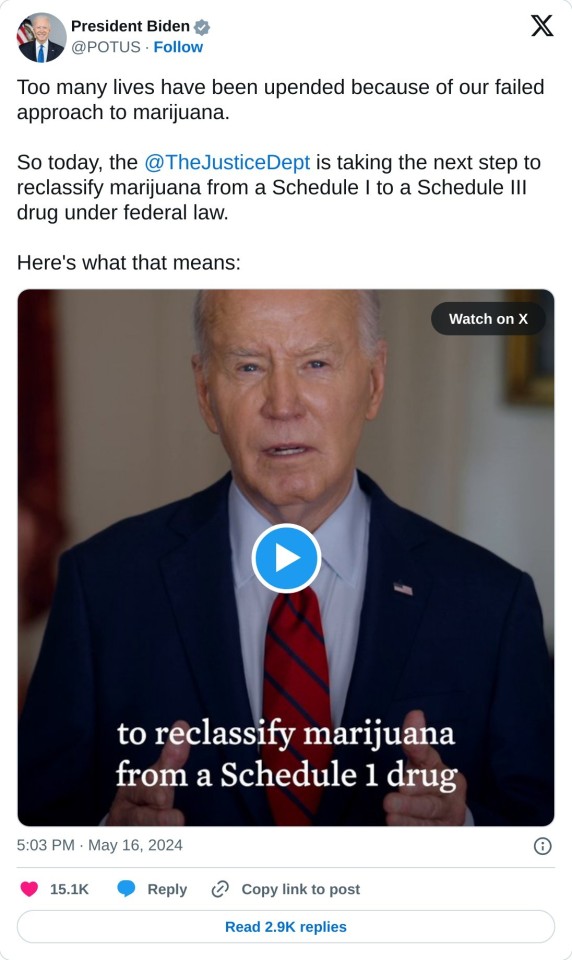
"Far too many lives have been upended because of a failed approach to marijuana and I'm committed to righting those wrongs," added Biden.
With marijuana classified under Schedule III, the federal government would for the first time officially acknowledge the medical benefits of the substance, which is approved for medical use in 43 U.S. states and territories as well as the District of Columbia.
Federal scientists will be able to research the medical benefits of the drug for the first time since 1971, when the Controlled Substances Act placed marijuana under Schedule I.
The new classification could also eliminate tax burdens for legal cannabis businesses.
Paul Armentano, deputy director of the National Organization for the Reform of Marijuana Laws (NORML), said Biden's decision "validates the experiences of tens of millions of Americans, as well as tens of thousands of physicians, who have long recognized that cannabis possesses legitimate medical utility."
"As a first step forward, this policy change dramatically shifts the political debate surrounding cannabis," Armentano added. "Specifically, it delegitimizes many of the tropes historically exploited by opponents of marijuana policy reform. Claims that cannabis poses unique harms to health, or that it's not useful for treating chronic pain and other ailments, have now been rejected by the very federal agencies that formerly perpetuated them. Going forward, these specious allegations should be absent from any serious conversations surrounding cannabis and how to best regulate its use."
Biden's announcement came a week after Senate Majority Leader Chuck Schumer (D-N.Y.) was joined by 17 other Democratic senators in reintroducing S. 4226, the Cannabis Administration and Opportunity Act (CAOA), which would remove marijuana from the Controlled Substances Act and allow states to regulate the substance.
Schumer applauded the White House for "recognizing that draconian cannabis laws need to change to catch up to science and the majority of Americans," but said marijuana must now be decriminalized at the federal level.
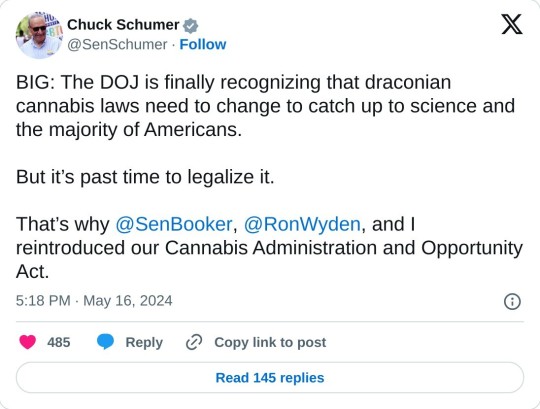
"The proposed change fails to harmonize federal marijuana policy with the cannabis laws of most U.S. states," said Armentano, "particularly the 24 states that have legalized its use and sale to adults."
cannabiscontrolled substances actdrug enforcement administrationjoe bidenschedule iiiu.s. department of justicemarijuana
#u.s. department of justice#marijuana#cannabis#controlled substances#drug enforcement administration
2 notes
·
View notes
Text
Improving Medical Records
It seems to me….
“The digital world has been in a separate orbit from our medical cocoon, and it’s time the boundaries be taken down.” ~ Eric Topol[1].
Progress in the medical field has, in general, been considerable slower than in other fields though more is invested in medical research. In some ways, there has been relatively little progress since the days of primitive shamans and medicine…
View On WordPress
#AI#ailment#Artificial Intelligence#biology#biomedical#Continuity of Care Document#Department of Veterans Affairs#Dmitri Mendeleev#FDA#Food and Drug Administration#Health Information Technology for Economic and Clinical Health (HITECH) Act#health record#Immunosenescence#medical#medical practitioner#Medical Records#Medical Research#medical science#medical system#medical treatment#patient#physician#RNA#therapeutic#Therapy#VA#Veteran&039;s Administration
2 notes
·
View notes
Text
COVID State of Emergency by the FDA
COVID State of Emergency by the FDA
April 7 2024By PK Morgan
Perhaps, in my previous article that contains a section on Emergency Use Authorization (EUA), I was a bit too vague or we are accustomed to taking everything our government dishes out regardless of legality. An EUA was issued for COVID tests on April 5 2024.
Why has the FDA approved a COVID/Flu self test in April of 2024 with…

View On WordPress
#covid#Covid 19#department of Human and Health Services#emergency use authorization#FDA#food and Drug Administration#HHS#incorrect#not approved
0 notes
Text
Stock Market Explodes After Biden Administration Urges Reclassifying Cannabis
By Steve Schain
Causing a day-long, double-digit Cannabis stock surge peaking at 40.56%, on August 30, 2023, the U.S. Department of Health and Human Services (“HHS”) recommended that the U.S. Drug Enforcement Administration (“DEA”) reschedule Marijuana from Schedule I to Schedule III of the Comprehensive Drug Abuse Prevention and Control Act of 1970, 21 U.S.C. §§ 801, Et. Seq (1970) (“Controlled…

View On WordPress
#IRS 280E tax code#Marijuana Rescheduling#U.S. Department of Health and Human Services (“HHS”)#U.S. Drug Enforcement Administration (DEA)
0 notes
Text
The Republican Taliban?
It would be a misstatement to say that Republican males hate women. They don’t hate us, but they also don’t see us as equals, either physically, intellectually, or culturally. We are, it would appear, put on this earth for their pleasure, to meet all their needs – sexually, taking care of their homes, cooking their meals, etc. Sadly, they have convinced many Republican women that this is the…

View On WordPress
#Comstock Act#Food & Drug Administration (FDA)#Joyce Vance#Judge Matthew Kacsmaryk#Mifepristone#Supreme Court&039;s Dobbs decision#U.S. Department of Justice#women&039;s rights
0 notes
Text
New Drug Registration Process & Format of Documents for Import in Nepal
New Drug Registration Process & Format of Documents for Import in Nepal
Here is the checklist and format of documents required for new drug product registration, company registration, Import of Radioactive Substances and Import of Intra OcularLenses (IOL) in Nepal. This checklist has developed by the Department of Drug Administration (DDA).
Checklist for Company Registration
S.No.Document required1Application by the importer for Company registration2Application by…

View On WordPress
#Department of Drug Administration#Drug Act#Drug and Medicine#Drug Registration Process#Drug Registration Regulation#National Drug Policy#National Plan Policy Guidelines#Policy & Guidelines
0 notes
Text
A big cost and concern for many seniors in the U.S. is the price of prescription drugs and other healthcare expenses—and this year, thanks to The Inflation Reduction Act, their costs may go down dramatically, especially for patients fighting cancer or heart disease.
I learned about the new benefits because my ‘Medicare birthday’ is coming up in a couple months when I turn 65. I was shocked that there were so many positive changes being made, which I never heard about on the news.
Thousands of Americans on Medicare have been paying more than $14,000 a year for blood cancer drugs, more than $10,000 a year for ovarian cancer drugs, and more than $9,000 a year for breast cancer drugs, for instance.
That all changed beginning in 2023, after the Biden administration capped out-of-pocket prescriptions at $3,500—no matter what drugs were needed. And this year, in 2024, the cap for all Medicare out-of-pocket prescriptions went down to a maximum of $2,000.
“The American people won, and Big Pharma lost,” said President Biden in September 2022, after the legislation passed. “It’s going to be a godsend to many families.”
Another crucial medical necessity, the shingles vaccine, which many seniors skip because of the cost, is now free. Shingles is a painful rash with blisters, that can be followed by chronic pain, and other complications, for which there is no cure
In 2022, more than 2 million seniors paid between $100 and $200 for that vaccine, but starting last year, Medicare prescription drug plans dropped the cost for shots down to zero.
Another victory for consumers over Big Pharma affects anyone of any age who struggles with diabetes. The cost of life-saving insulin was capped at $35 a month [for people on Medicare].
Medicare is also lowering the costs of the premium for Part B—which covers outpatient visits to your doctors. 15 million Americans will save an average of $800 per year on health insurance costs, according to the US Department of Health and Human Services.
Last year, for the first time in history, Medicare began using the leverage power of its large patient pool to negotiate fair prices for drugs. Medicare is no longer accepting whatever drug prices that pharmaceutical companies demand.
Negotiations began on ten of the most widely used and expensive drugs.
Among the ten drugs selected for Medicare drug price negotiation were Eliquis, used by 3.7 million Americans and Jardiance and Xarelto, each used by over a million people. The ten drugs account for the highest total spending in Medicare Part D prescription plans...
How are all these cost-savings being paid for?
The government is able to pay for these benefits by making sure the biggest corporations in America are paying their fair share of federal taxes.
In 2020, for instance, dozens of American companies on the Fortune 500 list who made $40 billion in profit paid zero in federal taxes.
Starting in 2023, U.S. corporations are required to pay a minimum corporate tax of 15 percent. The Inflation Reduction Act created the CAMT, which imposed the 15% minimum tax on the adjusted financial statement income of any corporation with average income that exceeds $1 billion.
For years, Americans have decried the rising costs of health care—but in the last three years, there are plenty of positive developments.
-via Good News Network, February 25, 2024
#united states#medicare#healthcare#healthcare access#big pharma#prescription drugs#health insurance#us politics#good news#hope#seniors#aging#healthy aging
2K notes
·
View notes
Text
President Joe Biden turns the Medical Marijuana Research Bill into law, changing how American scientists can do research on marijuana.
As anticipated by Marijuana Moment last week, the White House announced on Friday that President Biden signed the Medical Marijuana and Cannabidiol Research Expansion Act, "which establishes a new registration process for conducting research on marijuana and for manufacturing marijuana products for research purposes and drug development."
The bipartisan bill was introduced in July, quickly passed in the House in the same month, and unanimously approved by the Senate in November.
Rep. Earl Blumenauer (Democrat), who sponsored the bill, released a joint press statement along with Cannabis Caucus Co-Chairs Barbara Lee (Democrat), Dave Joyce (Republican), and Brian Mast (Republican) stressing the importance of such achievement.
"For decades, the federal government has stood in the way of science and progress—peddling a misguided and discriminatory approach to cannabis. Today marks a monumental step in remedying our federal cannabis laws. The Medical Marijuana and Cannabidiol Research Expansion Act will make it easier to study the impacts and potential of cannabis," the statement reads.
Furthermore, the Representatives highlighted how fundamental is medical research on marijuana to understand the full medicinal potential of the plant to treat a wide array of medical conditions and pledged to work on ending the war on drugs through a series of upcoming proposals that will reshape the status of marijuana at the federal level.
The law significantly eases the lives of scientists who wish to study marijuana for medical purposes, as they had to follow strict regulations that could delay their research.
The new legislation removes federal restrictions in order to ease research from studying the plant and speeds up the application process to approve marijuana-related scientific studies.
Under the new law, the federal government has to ensure an adequate, uninterrupted supply of marijuana available to scientists for studies on medical marijuana.
Therefore, researchers will be able to learn more about the plant's medical properties and request large amounts of marijuana to use for research.
In fact, the legislation now requires that within 60 days of receiving a researcher's application, the U.S. Attorney General has to approve it, request more information, or deny it specifying the reasons. If researchers submit more information upon request, the Attorney General has 30 days to decide.
Universities and research institutions will now be able to acquire U.S. Drug Enforcement Administration (DEA) license to grow, manufacture, distribute, dispense and possess marijuana for research purposes, with guidance from the Department of Health and Human Services (HHS) and the U.S. Food And Drug Administration.
Scientists who wish to do marijuana research may update their protocol without informing the DEA if the quantity and form of marijuana, the source, and the storage conditions of the material won't change.
The legislation also encourages the FDA to develop marijuana-derived medicines and addresses the HHS to determine the potential medical benefits of marijuana or cannabidiol (or CBD) as a drug.
The Medical Marijuana and Cannabidiol Research Expansion Act also intervenes in the doctor-patient relationship by allowing physicians to discuss the currently known potential harms and benefits of marijuana cannabinoids, such as CBD, as a treatment or the known possible damages and benefits of marijuana and its compounds.
Nevertheless, the legislation doesn't allow scientists to obtain marijuana from state-run dispensaries and won't reschedule marijuana at the federal level.
In fact, marijuana will remain illegal at the federal level under Schedule I of the Controlled Substances Act.
However, the legislation represents a significant step forward for medical research on marijuana in the U.S.
Before the new law, doing research on marijuana was very difficult in the U.S. as scientists needed approval from multiple agencies to conduct studies, which could sometimes take years.
Furthermore, scientists were only allowed to use marijuana grown by the University of Mississippi, although the DEA has recently awarded six other marijuana cultivation licenses for research to U.S. companies.
Biden's signature of The Medical Marijuana and Cannabidiol Research Expansion Act follows the executive order in October pardoning about 6,500 individuals convicted for marijuana possession at the federal level.
On that occasion, he also asked the Secretary of the HHS and the Attorney General to "initiate the process of reviewing how marijuana is scheduled under federal law."
Although the new law doesn't implement more reform at the federal level, it may pave the way for new federal legislation on marijuana, such as the SAFE Banking Act, that may ease the federal restrictions on the marijuana industry.
#us politics#news#forbes#2022#president joe biden#biden administration#medical marijuanna#marijuana#cannabis#Medical Marijuana and Cannabidiol Research Expansion Act#Rep. Earl Blumenauer#rep. Barbara Lee#rep. Dave Joyce#rep. Brian Mast#Cannabis Caucus#Department of Health and Human Services#drug enforcement agency#Food And Drug Administration#cbd#Controlled Substances Act#schedule 1
17 notes
·
View notes
Text
Three Myths and Three Facts on the HUGE Marijuana Rescheduling Recommendation
By Vince Sliwoski, Attorney at Harris Bricken
Huge news yesterday. Huge! The U.S. Department of Health and Human Services (HHS) has officially recommended that marijuana be rescheduled, from Schedule I to Schedule III of the federal Controlled Substances Act (CSA). This means that the country’s top health agency has finally conceded that cannabis has medical value, and isn’t a drug of abuse on…
View On WordPress
#Drug Enforcement Administration (DEA)#Rescheduling marijuana#The U.S. Department of Health and Human Services (HHS)
0 notes
Text
ISDH: List of locations for new COVID-19 boosters available
New Post has been published on https://aroundfortwayne.com/news/2022/09/13/isdh-list-of-locations-for-new-covid-19-boosters-available/
ISDH: List of locations for new COVID-19 boosters available
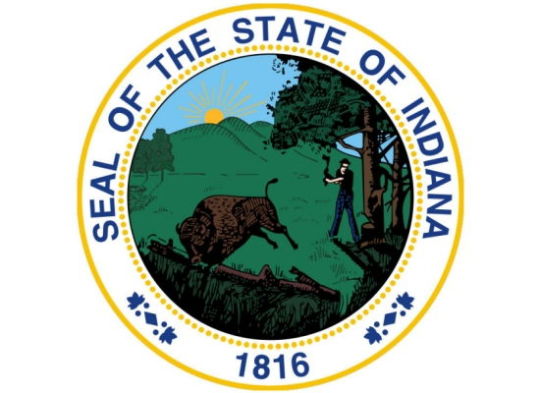
Today, the Indiana State Department of Health announced that it has added locations that are offering the new bivalent COVID-19 booster vaccines to its map.
#CDC Centers for Disease Control and Prevention#COVID-19 pandemic#COVID-19 vaccine#COVID-19 vaccine boosters#COVID-19 variant: Delta B.1.617.2#COVID-19 variant: Omicron B.1.1.529#FDA U.S. Food and Drug Administration#Indiana Health Commissioner Dr. Kris Box#Indianapolis Indiana#ISDH Indiana State Department of Health#Moderna COVID-19 bivalent booster#Moderna COVID-19 Vaccine#Pfizer COVID-19 bivalent booster#Pfizer-BioNTech COVID-19 vaccine
0 notes
Text
DOT Proposes New Guidance For Medical Examiners To Address CBD Use By Commercial Motor Vehicle Drivers
DOT Proposes New Guidance For Medical Examiners To Address CBD Use By Commercial Motor Vehicle Drivers
The U.S. Department of Transportation, Federal Motor Carrier Safety Administration (FMCSA) published a proposed draft Medical Examiner’s Handbook (MEH), including updates to the Medical Advisory Criteria, in the Federal Register on August 16, 2022. The FMCSA’s regulations provide the basic driver physical qualification standards for commercial motor vehicle (CMV) drivers, in 49 CFR…

View On WordPress
#business#Cannabis#CBD#Department of transportation#DOT#drug law#Federal Motor Carrier Safety Administration#FMCSA#Labor Law#legal#MEH#thc#USDOT
1 note
·
View note
Text
List of Narcotics and Psychotropic Substances identified for Import and Use in Nepal
List of Narcotics and Psychotropic Substances identified for Import and Use in Nepal
Here is the list of Narcotics and Psychotropic Substances identified for Import and Use in Nepal.
Narcotics
Codeine
Dextropropoxyphene
Ethylmorphine
Etorphine
Fentanyl
Methadone
Morphine
Phethidene
Pholcodine
Psychotropic Substances Schedule III
Buprenorphine
Glutethiamide
Pentazocine
Pentobarbital
Schedule…

View On WordPress
#DDA#Department of Drug Administration#Drug Act#Drug and Medicine#Drug Registration Process#Drug Registration Regulation#International Drug Monitoring#Narcotics#National Drug Policy#National Plan Policy Guidelines#Policy & Guidelines#Psychotropic Substances#Publications
0 notes
Text
The Best News of Last Week
1. ‘It was an accident’: the scientists who have turned humid air into renewable power
Greetings, readers! Welcome to our weekly dose of positivity and good vibes. In this edition, I've gathered a collection of uplifting stories that will surely bring a smile to your face. From scientific breakthroughs to environmental initiatives and heartwarming achievements, I've got it all covered.

In May, a team at the University of Massachusetts Amherst published a paper declaring they had successfully generated a small but continuous electric current from humidity in the air. They’ve come a long way since then. The result is a thin grey disc measuring 4cm across.
One of these devices can generate a relatively modest 1.5 volts and 10 milliamps. However, 20,000 of them stacked, could generate 10 kilowatt hours of energy a day – roughly the consumption of an average UK household. Even more impressive: they plan to have a prototype ready for demonstration in 2024.
2. Empty Office Buildings Are Being Turned Into Vertical Farms

Empty office buildings are being repurposed into vertical farms, such as Area 2 Farms in Arlington, Virginia. With the decline in office usage due to the Covid-19 pandemic, municipalities are seeking ways to fill vacant spaces.
Vertical farming systems like Silo and AgriPlay's modular growth systems offer efficient and adaptable solutions for converting office buildings into agricultural spaces. These initiatives not only address food insecurity but also provide economic opportunities, green jobs, and fresh produce to local communities, transforming urban centers in the process.
3. Biden-Harris Administration to Provide 804,000 Borrowers with $39 Billion in Automatic Loan Forgiveness as a Result of Fixes to Income Driven Repayment Plans

The Department of Education in the United States has announced that over 804,000 borrowers will have $39 billion in Federal student loans automatically discharged. This is part of the Biden-Harris Administration's efforts to fix historical failures in the administration of the student loan program and ensure accurate counting of monthly payments towards loan forgiveness.
The Department aims to correct the system and provide borrowers with the forgiveness they deserve, leveling the playing field in higher education. This announcement adds to the Administration's efforts, which have already approved over $116.6 billion in student loan forgiveness for more than 3.4 million borrowers.
4. F.D.A. Approves First U.S. Over-the-Counter Birth Control Pill
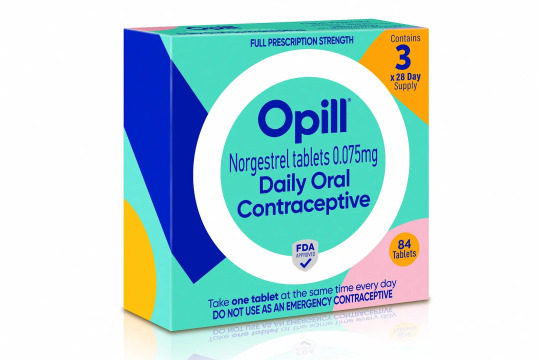
The move could significantly expand access to contraception. The pill is expected to be available in early 2024.
The Food and Drug Administration on Thursday approved a birth control pill to be sold without a prescription for the first time in the United States, a milestone that could significantly expand access to contraception. The medication, called Opill, will become the most effective birth control method available over the counter
5. AIDS can be ended by 2030 with investments in prevention and treatment, UN says
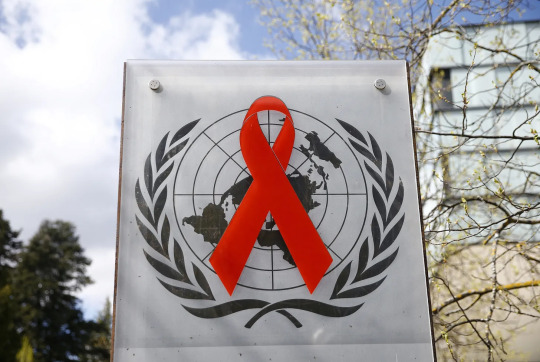
It is possible to end AIDS by 2030 if countries demonstrate the political will to invest in prevention and treatment and adopt non-discriminatory laws, the United Nations said on Thursday.
In 2022, an estimated 39 million people around the world were living with HIV, according to UNAIDS, the United Nations AIDS program. HIV can progress to AIDS if left untreated.
6. Conjoined twins released from Texas Children’s Hospital after successfully separated in complex surgery

Conjoined twins are finally going home after the pair was safely separated during a complex surgery at Texas Children’s Hospital in June.
Ella Grace and Eliza Faith Fuller were in the neonatal intensive care unit (NICU) for over four months after their birth on March 1. A large team of healthcare workers took six hours to complete the surgery on June 14. Seven surgeons, four anesthesiologists, four surgical nurses and two surgical technicians assisted with the procedure.
7. From villains to valued: Canadians show overwhelming support for wolves

Despite their record in popular culture, according to a recent survey, seven in 10 Canadians say they have a “very positive” view of the iconic predators.
Here's a fascinating video about how wolves changed Yellowstone nat'l park:
youtube
----
That's it for this week :)
This newsletter will always be free. If you liked this post you can support me with a small kofi donation:
Support this newsletter ❤️
Also don’t forget to reblog.
1K notes
·
View notes